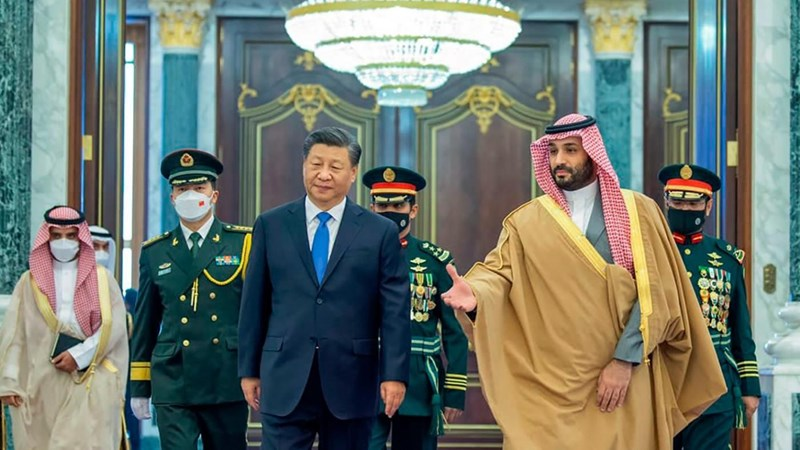Source: The Wall Street Journal

The increasing economic growth opportunities between China and the Middle East pose a great threat to the US and its influence in the region in the coming decades.
After Chinese leader Xi Jinping visited Saudi Arabia in December to meet Saudi Crown Prince Mohammed bin Salman, and later brokered a diplomatic breakthrough between Saudi Arabia and Iran, political flourishment was in its bloom state and so were business deals between China and the Middle East.
According to a report by The Wall Street Journal, state-owned oil giant Saudi Aramco intends to invest $3.6 billion in Hangzhou-based Rongsheng Petrochemical. Deals have also been signed such as a $5.6 billion investment into a joint venture with Human Horizons, a Chinese electric-vehicle company. An Abu Dhabi government-backed entity has bought a share valued at more than $730 million in NIO, another Chinese EV maker.
Following these deals, at the Arab-China Business Conference in Riyadh back in June, the head of Hong Kong’s stock exchange forecasted that the Middle East’s largest sovereign-wealth funds’ investments in China could amount to between $1 trillion and $2 trillion by 2030.
Read next: Xi intervened ‘personally’ in Saudi-Iran agreement: Wang Di
The increasing economic growth between China and the Middle East poses a great threat to the US as it attempts to control the oil-rich region in the coming decades. Chinese investment into the Middle East, or Saudi Arabia namely, is producing even more opportunities for ally-forming and political doorways.
It is worth mentioning that the Middle East has served as a better replacement or opportunity for Chinese firms cut off by the US.
Real-life examples
Nicolas Aguzin, the head of the Hong Kong stock exchange, stated that the sovereign-wealth funds only invest 1% to 2% of their assets in China currently, but believes that this will develop 10-fold.
Ethan Chan, chairman of Hong Kong-based asset manager ARTE Capital Group, said: “First, the relationship between the U.S. and the Gulf Cooperation Council has regressed, so they’re investing less into the U.S.,” adding: “Second, their allocation to China isn’t high enough.”
One sovereign-wealth fund that Chan works with is in the United Arab Emirates and invests around 7% of its entire stock in Chinese assets, which is a fifth of what it invests in the US. Chan expressed that doubling investments in China won’t be a problem.
Hong Kong-based artificial intelligence company blacklisted by the US, SenseTime, signed deals in Saudi Arabia this year in an effort to develop digital tourism and smart-city projects in the country.
Abu Dhabi’s sovereign-wealth fund Mubadala has been investing in Chinese artificial intelligence company 4Paradigm since 2021, according to S&P Global Market Intelligence. This March, the US added the company to its export control list.
More than networking
Chinese telecom mogul Huawei Technologies was at the forefront of the US-China tech battle around five years ago following accusations of violating sanctions on Iran, which sparked an effort by Canada to extradite the company’s CFO.
However, Huawei has been thriving in the Middle East, in addition to helping the UAE build the first 5G network in the Gulf region, per Jiawei Liu, the company’s chief executive in the UAE. The company has also signed agreements with Saudi Arabia’s state-owned telecoms company.
Furthermore, Hong Kong is also a winner of the growing ties between China and the Middle East.
Hong Kong’s chief executive, John Lee, headed a delegation to Saudi Arabia in February and persuaded Aramco to sell shares on Hong Kong’s stock exchange.
Nonprofit government entity Dubai Chambers is launching an office in Hong Kong after setting one up in the neighboring mainland city of Shenzhen. It stated that it intends to expand Dubai’s presence in Asia and help Hong Kong companies learn more about Dubai and network there.
In an interview with the South China Morning Post, Saudi Minister of Communications and Information Technology Abdullah Al-Swaha said that Saudi Arabia intends to strengthen its engagement with Hong Kong, utilizing the city as a bridge to mainland China to stimulate its transformation under the Vision 2030 economic plan.
Read more: China: Middle East land of its people, not anyone’s backyard
Filed under: China, GCC, Saudi Arabia, Uncategorized, USA | Tagged: MBS, Hong Kong, Aramco, Huawei, US Empire of Sanctions, Iran-Saudi Deal |
Related posts:
Views: 0
 RSS Feed
RSS Feed

















 July 14th, 2023
July 14th, 2023  Awake Goy
Awake Goy  Posted in
Posted in  Tags:
Tags: 
















